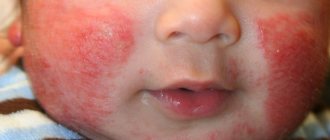During the neonatal period, unconditioned reflexes begin to work in the child. This is a natural reaction to certain external stimuli. Some of them gradually fade away, being replaced by acquired ones. The sucking reflex in newborns awakens from the first hours of life, persisting throughout the year. The baby grabs the nipple with his lips and sucks rhythmically. This unconditioned reflex is necessary for the formation of a conditioned reflex - food. No one teaches a child to suck - this is laid down by nature in the womb.
What reflexes do babies have (list and time of extinction) - read our article
What it is
The unconditioned sucking reflex has a huge impact on the formation of the baby’s psyche from early childhood. With its help, the baby satisfies hunger.
Sucking reflex test. How can I check (Photo)
When feeding, the nipple or teat on the bottle touches the palate, the reflex is triggered - and the baby actively begins to suck out the food. The severity of the sucking reflex determines how hungry the baby is. After saturation, the reflex weakens, but soon awakens again. Rhythmic sucking has a calming effect on the newborn.
There are 5 brain nerves responsible for sucking: the vagus (the shortest), ternary, sublingual, facial and glossopharyngeal. Their interaction is strictly coordinated by the sucking reflex. If the central nervous system or one of these nerves is damaged, the response weakens or disappears completely.
the newborn has no sucking reflex
?
Good evening, ladies. Maybe someone has come across this subject and can tell me their experience. A relative gave birth to a boy two days ago, a small 2500, however, the mother herself is small, thin and young, 19 years old. The child does not take the breast, bottle, pacifier, or finger. He is fed through a pipette in the maternity hospital; the baby has already lost 300 grams of weight. The doctors don’t really say anything, only that he is very small and can’t do it on his own yet, it takes time. At the same time, they threaten to leave him in the maternity hospital if he continues to lose weight. On the Internet they also write about possible problems with the central nervous system. Please tell us your experience. Thanks in advance.
UPD Thank you all so much for your responsiveness. On the 4th day the baby came to his senses (there was a difficult birth and 14 hours without water) and began to eat. During the first night I gained 50g. Mom and son are already at home.
Tags: 0-3 months, how are you?/baby, baby illnesses, artificial feeding, eats little, low birth weight babies, newborn
malyshi.livejournal.com
How to determine if the sucking reflex is normal
In order to awaken the sucking reflex, a bent finger is inserted 2-3 cm into the baby's mouth. A healthy full-term baby begins to suckle immediately. If the reaction is well developed, touching the lips and stroking the cheek is enough. The baby will open his mouth and begin to move his tongue intensively, as if sucking.
When assessing the sucking reflex, test feeding is used. They give the baby breastfeeding or a bottle of formula and see how he copes. With a weak reflex, the baby sluggishly sucks food. He quickly loses strength, rarely swallows and falls asleep. Subsequently, interest in the breast is lost, and the baby is even able to refuse it.
How many months does the sucking reflex last in a child, why can it be weak or absent?

Detailed article on the basic reflexes of newborns
The sucking reflex in a newborn is the ability to suck on the mother's breast or the nipple on a bottle of artificial nutrition placed in the mouth. Nobody teaches a baby to suck.
This is not a habit, but one of the important reflexes. It is formed during the intrauterine development process. And in the future it has an impact on the formation of the psyche in early childhood.
With the help of the sucking reflex, the newborn satisfies its hunger.
It occurs for the first time in life and is one of the innate reflexes that ensures the baby’s survival. This is the very first and most important unconditioned reflex.
During feeding, when the palate touches, the baby begins to suck milk from the mother's breast or from a bottle and sucks it in. The severity of the sucking reflex in newborns is determined by whether the child is hungry or full. After eating, the sucking reflex weakens.
But within an hour it makes itself felt again. Rhythmic sucking calms the baby very well.
It is very easy to check the sucking reflex in a child: you need to stroke the cheek or touch the lips. The baby will open his mouth and move his tongue as if he wants to suck.
Children are born with certain basic skills that help them survive, thrive, and thrive. The sucking reflex in newborns is one of the most important instincts inherent in nature. It is the presence or absence of the sucking reflex that is responsible for the timely and complete development of the newborn.
The lack of sucking skill in children does not allow them to eat. Even if you pour milk into the baby's mouth, he will not be able to swallow it. Such children are fed by tube or intravenously and their lives depend on whether this habit can develop in the future or not.
The presence of a reflex indicates the health of the baby and his central nervous system. A weakening of the skill is usually associated with improper actions of the mother or acquired diseases. We will talk in more detail in this article about how to check the presence of the instinct to satisfy hunger, how to develop it and why it is absent or weakened.
The formation of the sucking reflex in a newborn occurs in utero. A newborn baby is ready to suck on his mother’s breast or bottle; this process not only saturates him, but also calms him.
By the way, this is why many babies suck their fingers, fists or pacifiers. If a child lacks this natural skill completely, then, unfortunately, it is impossible to develop it.
Exceptions are premature babies, who, due to being born too early, could simply not have developed this habit.
In a healthy newborn, this skill is clearly expressed at birth and remains highly active for up to a year. The extinction of the sucking reflex occurs by 3-4 years.
At birth, doctors first assess the presence and extent of this innate habit. To do this, you just need to touch the child’s cheek or lips. If the reflex is increased, the baby will immediately begin to smack his lips, as if imitating sucking.
If there is no reaction to such a stimulus, a finger is inserted into the child’s mouth to evaluate sucking skills.
If the baby reacts sluggishly and inactively, then this indicates a weak skill, which will interfere with the necessary absorption of food and weight gain, all this will lead to general underdevelopment of both physical and psychosomatic indicators. If sucking is weak, a number of measures are taken to develop the skill.
An absent or weak sucking reflex is a serious cause for concern for adults. In both the first and second cases, medical assistance is needed.
The sucking reflex in premature infants may be completely absent or weakly expressed. When the lack of a formed habit is due only to the child’s prematurity associated with his early birth, then it can be acquired by gaining the required weight and growing the baby a little.
All this time, the newborn will be in the hospital, and nutrition will be delivered to him by a tube directly into the esophagus or intravenously through injections. If the habit is absent due to damage to the central nervous system, then, unfortunately, it is very difficult, and sometimes simply impossible, to help the baby.
- Stiffness of the facial nerves, which does not allow the baby to make sucking and swallowing movements.
- Somatic diseases.
- Mental retardation to a high degree.
- Underdeveloped or very weak muscle system around the mouth that moves the tongue.
- Acquired colds, leading to a runny nose and swelling, as well as stomatitis, which causes extremely painful sensations in the child when sucking.
Nipples that are uncomfortable to grasp and suck on can also weaken your baby's sucking reflex. If he has to make a lot of effort to extract milk from his mother’s breast, then he may simply fall asleep from fatigue during feeding, and gradually develop the habit of constant malnutrition, which will affect weight gain, the formation of the muscular system and the overall development of the child.
During the neonatal period, unconditioned reflexes begin to work in the child. This is a natural reaction to certain external stimuli. Some of them gradually fade away, being replaced by acquired ones.
We suggest you read: How much breast milk or formula should a newborn eat per day in the first days of life
The sucking reflex in newborns awakens from the first hours of life, persisting throughout the year. The baby grabs the nipple with his lips and sucks rhythmically. This unconditioned reflex is necessary for the formation of a conditioned reflex - food.
No one teaches a child to suck - this is laid down by nature in the womb.
What it is
The unconditioned sucking reflex has a huge impact on the formation of the baby’s psyche from early childhood. With its help, the baby satisfies hunger.
Sucking reflex test. How can I check (Photo)
When feeding, the nipple or teat on the bottle touches the palate, the reflex is triggered - and the baby actively begins to suck out the food. The severity of the sucking reflex determines how hungry the baby is. After saturation, the reflex weakens, but soon awakens again. Rhythmic sucking has a calming effect on the newborn.
There are 5 brain nerves responsible for sucking: the vagus (the shortest), ternary, sublingual, facial and glossopharyngeal. Their interaction is strictly coordinated by the sucking reflex. If the central nervous system or one of these nerves is damaged, the response weakens or disappears completely.
In order to awaken the sucking reflex, a bent finger is inserted 2-3 cm into the baby's mouth. A healthy full-term baby begins to suckle immediately. If the reaction is well developed, touching the lips and stroking the cheek is enough. The baby will open his mouth and begin to move his tongue intensively, as if sucking.
When assessing the sucking reflex, test feeding is used. They give the baby breastfeeding or a bottle of formula and see how he copes. With a weak reflex, the baby sluggishly sucks food. He quickly loses strength, rarely swallows and falls asleep. Subsequently, interest in the breast is lost, and the baby is even able to refuse it.
A baby’s reflexes are skills without which he simply cannot live fully. These include the sucking reflex. It is thanks to him that the baby develops harmoniously, receiving with mother’s milk all the necessary substances for full development and growth. If a newborn receives the breast on demand, he will begin to feel protected and loved.
Sucking is a very complex process. 5 pairs of nerves in the cranium are responsible for its implementation. It’s easy to check this reflex in a child - just stroke his cheek or touch his lips. The baby will open his mouth slightly and begin to move his tongue, as if he wants to suck.
The sucking reflex in a newborn is the ability to suck on the mother's breast or the nipple on a bottle with a mixture placed in the mouth.
No one specifically teaches a child to suck, since it is not a skill, but one of the most important reflexes (it is formed during the process of intrauterine development).
It occurs in the first hours and belongs to the group of innate reflexes that ensure the survival of the newborn. During the feeding process, when the palate touches, the baby begins to suck milk from the breast or from the bottle. The severity of the sucking reflex in a baby determines whether the baby is hungry or full.
The instinct weakens after eating, however, an hour later it reminds itself again. Rhythmic sucking has a good calming effect on the baby. During the sucking process, the baby may even fall asleep, because he feels under reliable mother’s protection, he is calm and comfortable.
Until what age does a newborn develop a sucking reflex?
As already noted, a born baby begins to suck after 2-3 hours, and the formation and emergence of this reflex occurs long before birth. A few hours after birth, the baby begins an active search for the mother's breast in order to realize its natural instinct.
The duration during which the sucking reflex in infants is most pronounced is the first 12 months of life. Then, closer to a year, it begins to weaken. And by about 3-4 years it disappears completely.
For this reason, many experts agree that breastfeeding is necessary until the sucking reflex completely disappears in accordance with the norms inherent in nature.
Weak sucking reflex in a newborn photo A weak sucking reflex in a newborn is detected during feeding, but sometimes mothers are not able to independently determine the presence of a problem. The sucking reflex is manifested in children by the ability to suck on the mother's breast or a pacifier placed in the mouth.
Weak or absent sucking reflex
The vital sucking reflex that allows a newborn to survive may be weakened for several reasons:
- paralysis of facial and cerebral nerves;
- severe somatic disorders that weaken the body;
- mental retardation;
- intrauterine oxygen starvation, causing damage to the nervous system.
Viral and infectious ailments, acute stomatitis, and a severe runny nose can reduce the sucking reaction. Since the baby is regularly malnourished, he has to be fed with expressed milk from a spoon, syringe, pipette or bottle. The baby may suck poorly due to the mother's flat, inverted nipples. But these cases are rare, and they can be dealt with using special silicone nipple covers.
When it turns out that the reflex is weakened, mommy should take immediate action. After all, this threatens a newborn with malnutrition, underweight, mental and neurological disorders, leading to developmental delays.
The subsidence of the sucking reflex requires an immediate visit to a neurologist and constant medical supervision of the child.
- birth injuries leading to damage to the medulla oblongata;
- deep prematurity;
- weakened facial muscles
cause the complete disappearance of the sucking reflex. The neurologist should examine the baby and evaluate his other unconditioned reflexes. After which observation will be carried out. Therapeutic treatment may be required.
The sucking reflex in premature babies is always weakened or completely absent. So that the child can develop normally, after birth he is fed through a tube or special nutritional solutions are administered intravenously. This method of feeding lasts until the sucking reflex appears to a pronounced degree and the nervous regulation mechanisms responsible for the baby’s reactions develop.
When a baby is reluctant to suck, the question of how to restore the reflex becomes paramount. This is where pacifiers and feeding the toddler with milk from a bottle come to the rescue. The doctor recommends a facial massage before each feeding. To restore the reaction, you should know the cause of the weak reflex, and, if possible, work to eliminate it. Without consulting experienced specialists, you cannot deal with the problem on your own. This is dangerous for the baby.
Restoring the reflex
The identified weak reflex at birth will not allow the mother and baby to get home on time, as doctors will eliminate the causes of the weakened habit. Discharge will be possible only after restoration of function.
If the sucking reflex has been weakened already during the life of the baby, then the first action of the mother is to contact a pediatrician and neurologist. Only after their consultations and recommendations should the cause be eliminated.
Weakening of sucking function occurs against the background of one of the above reasons. The reflex can be improved if you approach it responsibly and systematically. In most cases, weakened function is restored by organizing more frequent feedings. If you are breastfeeding, you may need to express milk and bottle feed your baby.
An additional method of developing the reflex can be a prescribed massage of the facial muscles. The doctor must teach the mother the correct massage movements, which she will regularly perform on the baby’s face.
We suggest you read: The best remedy for colic in newborns, description of medications
It is important not only to teach the baby a new skill, but also to monitor the dynamics of development. Self-medication in this case is strictly prohibited, and during the restoration of function, be sure to regularly consult with a doctor until the problem ends.
An unsatisfied sucking reflex can lead to atrophy of function, so it is very important to feed the baby, if he is breastfed, on demand. Formula-fed newborns should be fed from a bottle with a small hole so that they eat for at least 15-20 minutes. The pacifier has a positive effect on maintaining and developing the sucking reflex.
A child’s health is formed by a number of reasons, both external and internal. Maintaining the necessary balance falls entirely on the shoulders of the parents; it depends on them how the child will grow and develop, how healthy and fulfilling his future will be.
If the baby sucks very weakly, the question of how to develop it is extremely important for his health. Organizing feedings, using a pacifier and bottle feeding helps with this. The doctor will also recommend performing a special facial massage before feeding. Of course, for successful recovery it is important to take into account the reason for its weakening, so no action should be taken without consultation and advice from a doctor.
You can learn about the benefits of a pacifier in its development by watching the following video.
At what age should it pass
Many mothers are interested in what age does a child develop a sucking reflex? Children older than one and a half years old no longer need it and the reaction gradually fades away. Sucking movements with the lips and tongue persist for another 2-2.5 years.
Children who were weaned early and fed with adapted formulas did not fully realize their natural instinct to suck. This is fraught with the development of neuroses and obsessive movements.
A child may develop unpleasant habits that are difficult to get rid of over many years:
- sucking various objects (fingers, pens, ends of hair, edges of pillows, toys, etc.);
- habit of biting fingernails and toenails;
- in adulthood this manifests itself in the desire to smoke. With any stress and conflict, a person unconsciously reaches for a pack of cigarettes.
This means that the baby must fully go through the oral stage of development, satisfying his sucking reflex, so that neurotic reactions and bad habits do not form in the future. Infants weaned early from their mother's breast should develop with a pacifier as a sucking object. In the preschool period, if a child has not received either a pacifier or a breast, he may behave aggressively, bite other children, be sarcastic, and snap. Such babies are characterized by weak appetite, moodiness, and pain.
The baby is offered a pacifier between feedings, and is weaned off it gradually - without punishment or negative emotions (see article about weaning off a pacifier). In an affectionate playful way, the baby is told that the pacifier went to another baby, got lost, and was taken by a fairy.
Why might he be missing?
If this action is weak, the baby sucks very sluggishly at the breast or bottle, quickly falling asleep during feeding, or even refusing to eat altogether. This happens in weakened, injured during childbirth or premature babies. They are discharged from the inpatient department when the baby gets used to sucking milk well. A decrease in the sucking reflex can be observed for the following reasons:
- hypoxic-traumatic damage to the central nervous system of the child in the womb or during childbirth;
- severe somatic diseases (due to general weakness and malaise);
- paresis and paralysis of the cranial nerves, in particular the facial one;
- mentally retarded children;
- severe stomatitis, respiratory viral infections, rhinitis;
- flat-shaped mother's nipples.
With a reduced sucking reflex, the child is constantly malnourished, so he must be fed with a spoon or expressed milk from a bottle every 2 or 2.5 hours.
Any deviation in the baby’s condition is a reason to consult a doctor, because this may be a signal of the development of a serious pathology that requires immediate treatment. A decrease in the sucking reflex requires dynamic monitoring with the involvement of a neurologist.
The absence of a sucking reflex is the first symptom of damage to the central nervous system, or rather the stem part of the medulla oblongata, and an unfavorable prognostic sign. Such babies have very little chance of survival; they have to be fed only through a tube.
Reasons for the complete absence of sucking in children:
- trauma to the medulla oblongata during childbirth;
- weakness of the masticatory muscles, orbicularis oris muscle, tongue;
- deep prematurity.
Reasons for absence or weakening
The sucking reflex may be absent when:
- Paresis of the facial nerves.
- Severe somatic illness of the child.
- High degree of mental retardation.
- Hypoxia during pregnancy or childbirth, causing damage to the central nervous system.
- Weakening of the muscles responsible for chewing, the muscles of the tongue and mouth.
- Deep prematurity.
- Birth injuries of the spinal cord.
Diseases such as acute respiratory viral infections, stomatitis or a runny nose can lead to a decrease in the sucking reflex. Also, its weakened degree can be provoked by flat nipples in the mother.











